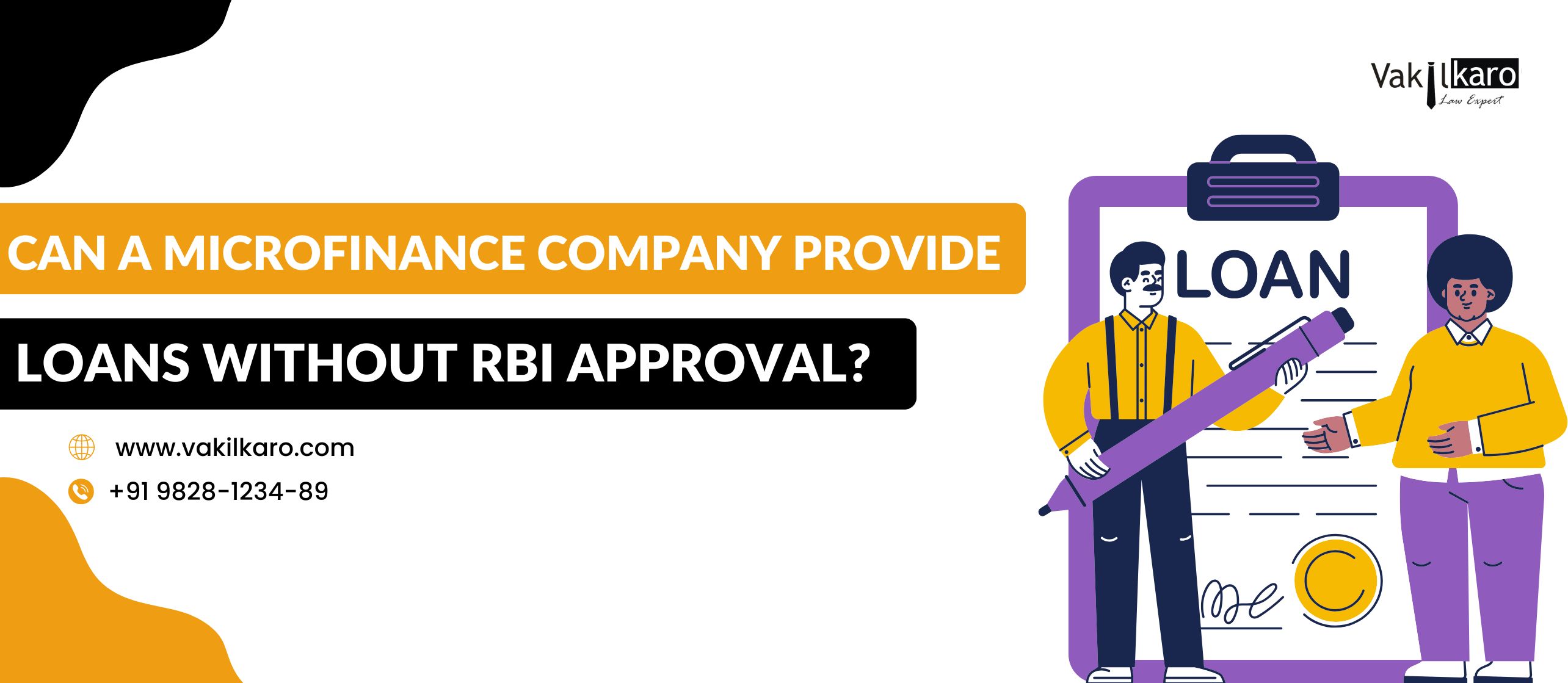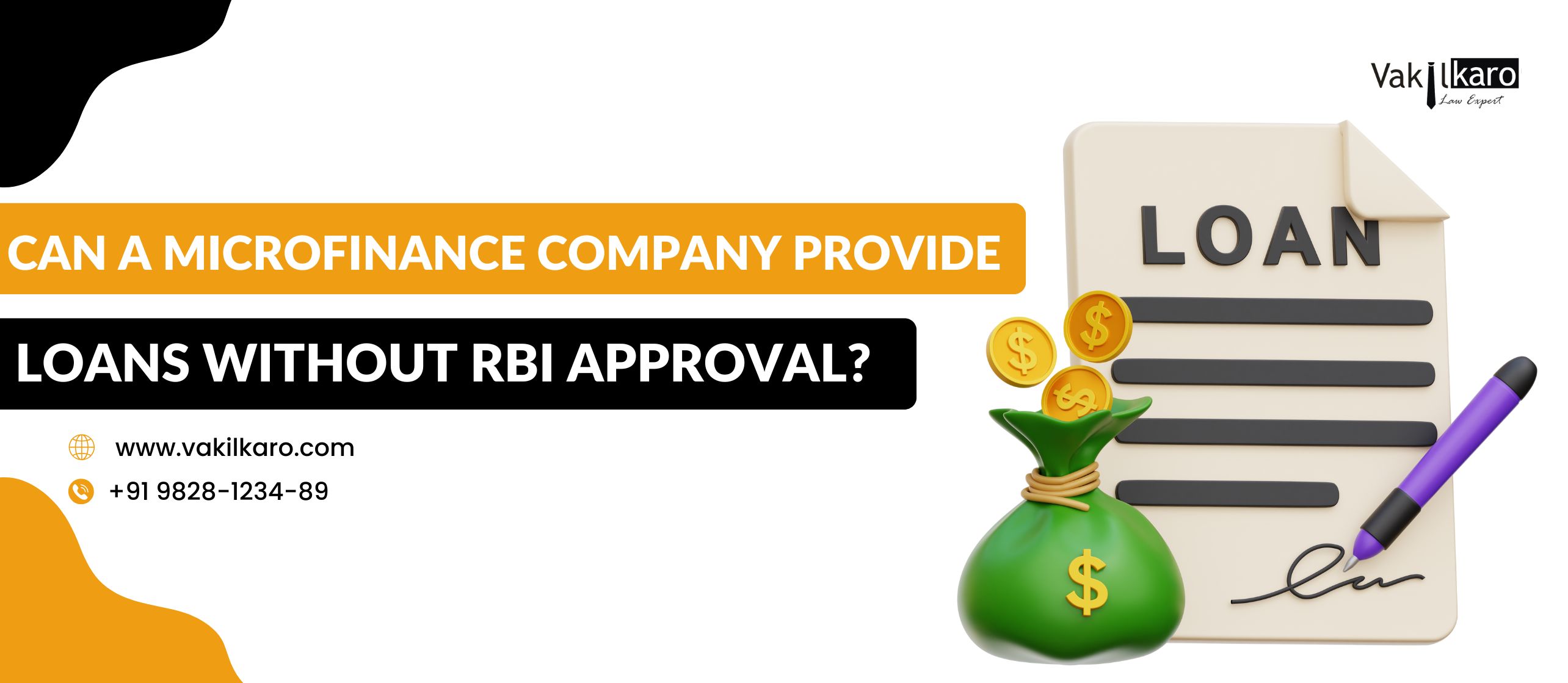Section 8 Microfinance Company Providing Loans Without RBI Approval
A microfinance Section 8 company plays a vital role in providing financial assistance to underserved communities without requiring RBI approval. Unlike Non-Banking Financial Company-Microfinance Institutions (NBFC-MFIs), which need RBI licensing and strict regulatory compliance, a Section 8 company microfinance operates as a not-for-profit entity under the Companies Act, 2013. Its primary goal is financial inclusion rather than profit generation, allowing it to offer microloans to low-income individuals and small businesses.
The Section 8 microfinance company registration process involves several steps, including obtaining a Digital Signature Certificate (DSC) and Director Identification Number (DIN), reserving a unique company name, and drafting the Memorandum of Association (MOA) and Articles of Association (AOA). Entrepreneurs must then file the incorporation application with the Ministry of Corporate Affairs (MCA) and obtain necessary tax registrations such as PAN and TAN. Once registered, the company can begin providing microfinance services legally.
A Section 8 company microfinance company registration enjoys several advantages, including exemption from RBI regulations, tax benefits under Section 12AA and 80G of the Income Tax Act, and lower compliance requirements. However, it faces funding limitations since it cannot accept public deposits or generate profits for shareholders. Instead, these companies rely on donations, grants, and external funding to sustain operations.
For aspiring entrepreneurs, starting a microfinance Section 8 company is an effective way to support financial inclusion with minimal regulatory hurdles. However, adherence to compliance requirements, including financial reporting, income tax filings, and corporate social responsibility (CSR) obligations, is essential for smooth operations. Consulting legal and financial experts can help navigate the registration and compliance process, ensuring the microfinance company operates efficiently while making a meaningful impact on economic empowerment.
Introduction
Microfinance plays a crucial role in providing financial assistance to low-income individuals, small businesses, and self-employed entrepreneurs who lack access to traditional banking services. With the rising demand for microfinance services, many aspiring entrepreneurs seek to establish microfinance institutions (MFIs). However, a common question that arises is: Can a microfinance company provide loans without RBI approval? This blog explores the regulatory framework governing microfinance companies, including the Section 8 Microfinance Company registration process, RBI regulations, and compliance requirements.
Understanding Microfinance and Its Importance
Microfinance refers to financial services, including loans, savings, insurance, and remittances, offered to individuals and businesses that do not have access to conventional banking. It is designed to promote financial inclusion and economic empowerment by enabling self-employment, supporting small enterprises, and improving livelihoods.
A Section 8 company microfinance is one of the most common structures used to establish a microfinance institution in India. It operates as a non-profit entity and is regulated under the Companies Act, 2013 allowing it to provide financial assistance for social and economic development.

Regulatory Framework for Microfinance Companies in India
Microfinance institutions (MFIs) are governed by the Reserve Bank of India (RBI) and must comply with various regulatory requirements. The two primary types of microfinance institutions are:
- Non-Banking Financial Company – Microfinance Institution (NBFC-MFI): Requires RBI registration and must comply with specific capital adequacy and lending norms.
- Section 8 Company Microfinance: Can provide microloans without RBI approval but must adhere to guidelines specified under the Companies Act, 2013.
Can a Microfinance Company Provide Loans Without RBI Approval?
The ability of a microfinance company to provide loans without RBI approval depends on its structure:
1. NBFC-MFIs: RBI Approval Required
- Any microfinance company operating as an NBFC-MFI must obtain an RBI license before commencing lending activities.
- The company must maintain a minimum net owned fund (NOF) of ₹5 crore (₹2 crore for the northeastern region).
- It must follow lending restrictions, such as loan limits, interest rate caps, and repayment tenure requirements specified by the RBI.
2. Section 8 Microfinance Company: RBI Approval Not Required
A Section 8 company microfinance can provide loans without obtaining an RBI license. However, it must operate as a not-for-profit entity, ensuring that its primary objective is financial inclusion rather than profit generation.
- These companies are regulated under the Companies Act, 2013 and do not fall under RBI’s jurisdiction for lending activities.
- They are allowed to provide loans at low or no interest rates to support economically weaker sections of society.
- Since they do not accept public deposits, they are exempt from RBI’s NBFC registration requirements
Section 8 Microfinance Company Registration Process
To establish a microfinance Section 8 company, the following steps must be followed:
Step 1: Obtain Digital Signature Certificate (DSC) and Director Identification Number (DIN)
The first step in the registration process is obtaining DSC and DIN for the company’s directors. These are necessary for filing online registration applications with the Ministry of Corporate Affairs(MCA).
Step 2: Name Reservation
The applicant must submit a name approval request usingRUN (Reserve Unique Name) facilityon the MCA portal. The name should include terms like ‘Foundation,’ ‘Society,’ or ‘Association’ to indicate a non-profit nature.
Step 3: Drafting Memorandum of Association (MOA) and Articles of Association (AOA)
The company’s MOA and AOA must outline its objectives, including providing microfinance services for social welfare.
Step 4: Filing Section 8 Incorporation Application
The incorporation application (SPICe+ Form) must be submitted to the Registrar of Companies(ROC) along with the required documents:
- MOA & AOA
- Identity and address proof of directors
- Declaration in Form INC-14 and INC-15

Step 5: Issuance of Certificate of Incorporation
Upon approval, the ROC issues a Certificate of Incorporation officially recognizing the entity as a Section 8 company microfinance institution.
Step 6: Apply for PAN, TAN, and NGO Registration
Once incorporated, the company must obtain PAN, TAN, and NGO registration to comply with taxation and legal requirements.
Advantages of Section 8 Company Microfinance
- No RBI Approval Required: Unlike NBFC-MFIs, Section 8 companies can provide microfinance loans without RBI registration.
- Tax Benefits: These companies enjoy tax exemptions under Section 12AA and 80G of the Income Tax Act
- Social Impact: They focus on financial inclusion and poverty alleviation rather than profit maximization.
- Lower Compliance Requirements: They are subject to the Companies Act but do not need to adhere to stringent RBI norms.
Limitations of Section 8 Microfinance Companies
- Restricted Lending Capacity: They cannot accept public deposits or operate with commercial lending motives.
- Funding Challenges: Since they do not operate for profit, they rely on donations, grants, or external funding for sustainability.
- Limited Profit Distribution: Any surplus funds must be reinvested in social activities rather than distributed as dividends.
Compliance Requirements for Microfinance Section 8 Companies
To operate legally, a Section 8 microfinance company must adhere to:
- Annual Financial Reporting: File annual returns with the MCA.
- Income Tax Filings: Maintain compliance under Income Tax Act, 1961.
- CSR and Social Welfare Regulations: Engage in activities that align with social development objectives.
Correlation Between Section 8 Microfinance Company Registration and NBFC Registration
The Section 8 microfinance company registration process and NBFC registration serve different regulatory purposes in the microfinance sector. A Section 8 company microfinance is a not-for-profit entity registered under the Companies Act, 2013, allowing it to provide microloans without RBI approval. In contrast, an NBFC-MFI must register with the RBI, comply with capital requirements, and adhere to strict lending norms. While NBFC registration enables commercial lending, a microfinance Section 8 company focuses on social welfare, offering loans at low or no interest. Entrepreneurs must choose between the two based on their objectives, compliance capacity, and operational structure.
Conclusion
The ability of a microfinance company to provide loans without RBI approval depends on its legal structure. While NBFC-MFIs require RBI registration, a Section 8 company microfinance institution can operate without RBI approval, provided it functions as a non-profit organization. Entrepreneurs looking to establish a microfinance business with minimal regulatory hurdles can opt for a Section 8 Microfinance Company to support financial inclusion and economic empowerment. However, it is essential to comply with the Section 8 microfinance company registration process and adhere to relevant legal guidelines to ensure smooth operations.
For those looking to start a microfinance Section 8 company, consulting with legal and financial experts can help navigate the registration and compliance process effectively. By choosing the right business model, microfinance institutions can make a meaningful impact while staying compliant with regulatory frameworks.
Why Choose VakilKaro for Section 8 Microfinance Company Registration and Other Related Services?
VakilKaro is a trusted legal and financial services provider known for its expertise in business registration, compliance, and regulatory approvals. When it comes to Section 8 Microfinance Company registration, VakilKaro ensures a hassle-free process by handling documentation, approvals, and legal formalities efficiently. Their team of experts provides personalized guidance, ensuring compliance with the Companies Act, 2013 and other regulatory frameworks.
Additionally, VakilKaro offers end-to-end support for NBFC registration, RBI compliance, trademark registration GST return filing and business licensing. Their commitment to accuracy, transparency, and affordability makes them the ideal partner for all your legal and financial requirements.